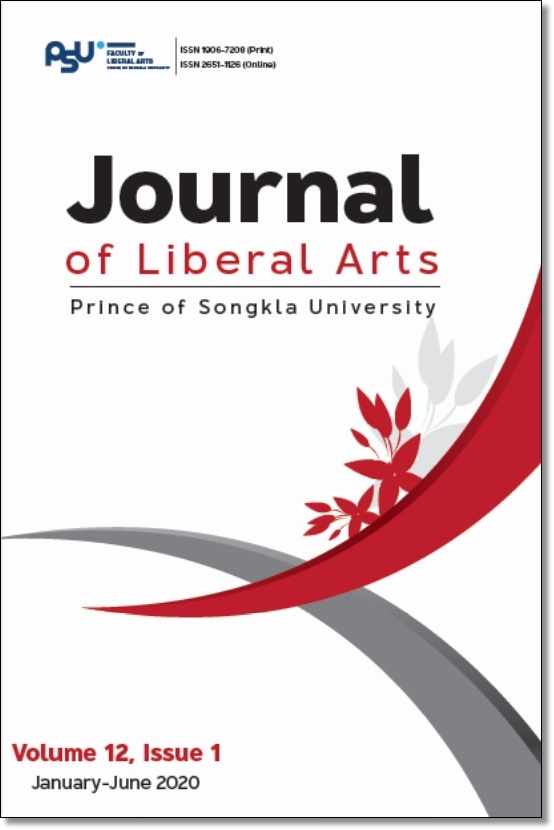Re-examining the Values of Self-Reliance in Thailand’s Social Contexts through the Author’s Fieldwork Experiences and Reflexivity
Keywords:
governmentality, hegemony, reflexivity, self-reliance, valuesAbstract
This re-examination of the values of self-reliance in Thailand’s social contexts begins with the survey and the review of Dependency Theory by some of the Neo-Marxists. The theory significantly critiqued the unsymmetrical structure of global capitalism. This later contributed to knowledge spaces for alternative development so as to help to make change for either a fairer structure or a delinking from such existing unfair structure. The values of self-reliance as one of the approaches for alternative development have been able to insert themselves within the knowledge demarcation of development practices. Such values were clearly introduced and cultivated in people’s consciousness in the nation since the 1997 economic crisis as it was believed that people suffering from its effects would be able to survive by themselves in this hard time. These have possibly brought about the inability and uncriticality of the people in the long run to carefully consider such values’ pros and cons and to freely tap into other possibilities of development practices. It has been as if the people had been domesticated to such values’ hegemonic power and influence. However, to understand these cannot be devoid of the review of Gramsci’s and Foucault’s concepts of Hegemony and Governmentality respectively. The paper also proposes that being deceptively domesticated ontologically exists. Superficially, complying with such values does not mean that the people are truly domesticated. Under the guise of being deceptively domesticated, some people start forming intellectually reciprocal relations rather than being radically self-reliant but isolated as before. There is no use for them relying on themselves without any outside care for. This seems truly inclusive development in their views.
References
Argyrou, V. (2005). The logic of environmentalism: Anthropology, ecology, and postcoloniality. Berghahn Books.
Berger, R. (2015). Now I see it, now i don’t: Researcher’s position and reflexivity in qualitative research. Qualitative Research, 15(2), 219-234.
Escobar, A. (1995). Encountering development: The making and unmaking of the third world. Princeton. Princeton University Press.
Fischer, K. (2016). Collective self-reliance: failed idea or still a valuable contribution worth considering?, in (Conflicting) Political Ontologies and Implications for Transformative Action, 27th of May 2016, Department of Sociology, University of Ljubljana.
Frank, A. G. (1967). Capitalism and underdevelopment in Latin America. Monthly Review.
Ferguson, J. (2014). The anti-politics machine: “Development,” depoliticization, and bureaucratic power in Lesotho. (10thed.). Cambridge University Press.
Galtung, J. (1980). Self-reliance: concept, practice and rationale. Institut Universitaire d'Etudes du Développement. Geneva.
Gardner, K., & Lewis, D. (1996). Anthropology, development and the post-modern challenge. Pluto Press.
Jitsanguan, T. (2006). The study on guidelines for the application of the sufficiency economy's philosophy: Lesson learned from 40 cases. A Research Report Submitted to Office of the National Economic and Social Development Board. [in Thai]
Lindgren, C. J., & Baliño T.J.T. (1999). Financial sector crisis and restructuring lesson from Asia. International Monetary Fund.
Mingnolo, W. D. (2007). Delinking. Cultural Studies, 21(2-3), 449-514.
Office of the National Economic and Social Development Board. (2018). The national economic and social development plans. NESDPs 1st-12th. http://www.nesdb.go.th/main.php?filename=develop_issue
O’Dwyer, K. (2012). Emerson’s argument for self-reliance as a significant factor in a flourishing life. Journal of Philosophy of Life, 2(1), 102-110.
Pillow, W. (2003). Confession, catharsis, or cure? Rethinking the uses of reflexivity as methodological power in qualitative research. International Journal of Qualitative Studies in Education, 16(2), 175-196.
PhuangNgam, K. (2010). Community and local self governance. Bophit Press. [in Thai]
Smart, B. (1985). Michael Foucault. Ellis Horwood.
Srisan, S. (2014). Editorial acknowledgment. Journal of Graduate Volunteer Centre, 11(1), 1-3. [in Thai]
Thomas, J. (1993). Doing critical ethnography. Sage.
Villalba, U. (2013). Buen Vivir vs Development: A paradigm shift in the Andes?. Third World Quarterly, 34(8), 1427-1442.
Wallerstein, I. (1974). The modern world system: Capitalist agriculture and the origins of the European world economy in the sixteenth century. Academic Press.
Watene, K. (2016). Valuing nature: Māori philosophy and the capability approach. Oxford Development Studies, 44(3), 287-296.
Williams, R. (1977). Marxism and literature. Oxford University Press.
Downloads
Published
How to Cite
Issue
Section
License
The authors retain the copyright to their article but the Journal of Liberal Arts, Prince of Songkla University reserves the exclusive rights to first publication.






